苏教版牛津英语七年级下册第七单元知识点
七年级英语下册unit7知识点

七年级英语下册unit7知识点Unit 7 of seventh grade English textbook focuses on describing past events and situations using the past simple tense. It also introduces some useful expressions to describe past experiences and offers opportunities for students to learn and practice using the target language. Here are the main knowledge points covered in Unit 7:1. Past Simple TenseThe past simple tense is used to describe finished actions, situations or events that happened at a specific time in the past. It is formed differently depending on the verb type:Regular verbs: add -ed to the base form of the verb (e.g. walk - walked, watch - watched)Irregular verbs: the past tense is formed in various ways, some verbs have different spelling, some use the same word as the base form (e.g. go - went, eat - ate)Negative sentences are formed using the auxiliary verb "did" in the past simple and the base form of the main verb (e.g. I didn't eat breakfast this morning.)Questions are formed using the auxiliary verb "did" and the base form of the main verb (e.g. Did you watch the TV last night?)2. Time expressionsIn order to give more precise information about when an event happened, certain expressions are used such as:Yesterday, the day before yesterday, last week, last month, last year, two days ago, ten minutes ago3. Useful expressions to describe past experiencesTo describe past experiences, some useful expressions can be used, including:I had a great time, it was fantastic/amazing, I enjoyed myself, It was fun, I loved it4. Listening and speaking practiceIn Unit 7, students have the opportunity to listen to and speak about past events using the past simple tense. They are guided through a series of activities that involve listening to people describe their past experiences and then sharing their own. Students are encouraged to use new vocabulary and expressions they have learned to describe their experiences.5. Reading and writing practiceIn the reading and writing section, students are asked to read a short story and answer comprehension questions, as well as write a paragraph about a personal experience. This provides students with an opportunity to practice their reading and writing skills, as well as using the target language to describe past events.ConclusionUnit 7 of the seventh grade English textbook provides students with a useful and practical introduction to using the past simple tense to describe past events and experiences. By practicing listening, speaking, reading, and writing, students will be able to gain the confidence and skills necessary to communicate effectively in English.。
江苏省苏州市昆山市七年级英语下册Unit7Abilities语法归纳无答案新版牛津版

7下Unit7 语法概括:一、can/could 和may的用法例句canspeakgoodEnglish.oldmancouldswimacrosstheYangtzeRiver.3.——MayIuseyourmobilephone?——Ofcourseyoumay.Can和could 表示能力〔1〕can表示此刻的能力,could表示过去的能力。
can’tspeakFrench,butIcanspeakEnglish.Shecouldplaythepianowhenshewasonlysix. can表示能力时,与beableto意思同样,但can只有此刻时和过去时两种时态,而beableto 能够用于各样时态。
Can,could和may表示允许或可能性〔1〕表示允许时,could比can更委宛,而may改正式一些。
——CouldIsmokehere? ——Sorry,I ’mafraidyoucan’t.(2) can,could 和may表示可能性Can表示推断“可能性〞时,常常用于否定句或疑问句。
定。
Can用在疑问句中,意为“可能〞。
Can’t意为“不行能〞,语气很肯Hecan’tbeathomebecausehehasgonetoShanghai.Could可用于某事有可能发生或可能是事实。
Theplanecouldbedelayedbyfog.May表示推断时,能够用于一定句或否定句,但一般不用于疑问句。
Hemaynotbeathome.Ithinkweshouldtakeraincoatswithus,itmayrain.Must也能够表示一定地推断。
Mr.Limustbeintheroom,look,thelightison.有关练习:Jennyfinallygotthejobbecauseshe________speakEnglishwell.——Iforgottobringmydictionary.CouldIuseyours?——Yes,you________.A. canB.mustC.couldD.should用can,can’t,could,couldn’t或may填空__________youplaythepianolastyear?No,I_________.__________Annarideahorsenow?Yes,she_________.__________Iborrowsomemoneyfromyou?Sorry,you_________.句型变换Sandycanrowaboatnow.( 用2yearsago 作时间状语改写句子Sandy________________aboattwoyearsago.( 同义句)Sandy_________________________________aboattwoyearsago.)二,What和How指引的感触句1. 用来表达喜、怒、哀、乐等激烈感情的句子叫感触句。
江苏省涟水县红日中学七年级英语下册《Unit 7 Abilities》知识点归纳 (新版)牛津版
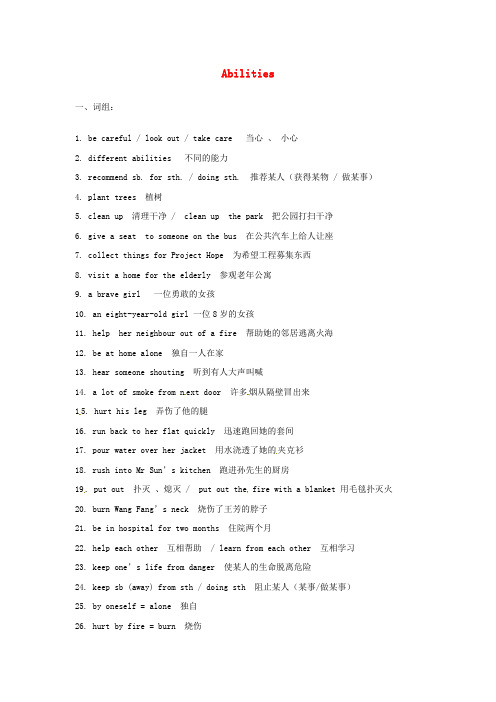
Abilities一、词组:1. be careful / look out / take care 当心、小心2. different abilities 不同的能力3. recommend sb. for sth. / doing sth. 推荐某人(获得某物 / 做某事)4. plant trees 植树5. clean up 清理干净 / clean up the park 把公园打扫干净6. give a seat to someone on the bus 在公共汽车上给人让座7. collect things for Project Hope 为希望工程募集东西8. visit a home for the elderly 参观老年公寓9. a brave girl 一位勇敢的女孩10. an eight-year-old girl 一位8岁的女孩11. help her neighbour out of a fire 帮助她的邻居逃离火海12. be at home alone 独自一人在家13. hear someone shouting 听到有人大声叫喊14. a lot of smoke from n ext door 许多烟从隔壁冒出来15. hurt his leg 弄伤了他的腿16. run back to her flat quickly 迅速跑回她的套间17. pour water over her jacket 用水浇透了她的夹克衫18. rush into Mr Sun’s kitchen 跑进孙先生的厨房19. put out 扑灭、熄灭 / put out the fire with a blanket 用毛毯扑灭火20. burn Wang Fang’s neck 烧伤了王芳的脖子21. be in hospital for two months 住院两个月22. help each other 互相帮助 / learn from each other 互相学习23. keep one’s life from danger 使某人的生命脱离危险24. keep sb (away) from sth / doing sth 阻止某人(某事/做某事)25. by oneself = alone 独自26. hurt by fire = burn 烧伤27. thank you for joining us 感谢你加入我们28. take part in (活动) = join 参加29. sound dangerous 听起来是危险的30. do something for your own safety 为你自己的安全采取措施31. what happened to Wang Fang 王芳发生了什么事32. a good idea 一个好主意33. get better 变得更好34. be careful with matches 小心火柴35. Do not leave the stove on . 别让炉火开着。
苏教牛津译林版初中英语七年级下册Unit 7 Abilities2PPT课件

What can we learn from the story?
It is important to be careful with fire. And we should help each other.
Discussion: Right or wrong
1
2
3
4
5
6
7
8
Hale Waihona Puke rong1We can’t play with matches. We should be careful with matches.
3. Why couldn’t his neighbour Mrs Sun get out? She couldn’t get out because she hurt her leg.
4. What did Lin Tao do? Zhang Hua quickly ran back to his flat and poured water over his jacket. Then he rushed into Mrs Sun’s kitchen to save her....
Questions:
1. When was Lin Tao at home alone? Zhang Hua was at home alone on 10th May.
2. What did he see from next door? He saw a lot of smoke from next door.
Right
2
When there is a fire , we should call 119 at once.
Wrong
3
We can’t put anything hot into the rubbish bin.
江苏省永丰初级中学七年级英语下册Unit7Abilities知识点复习(无答案)(新版)牛津版
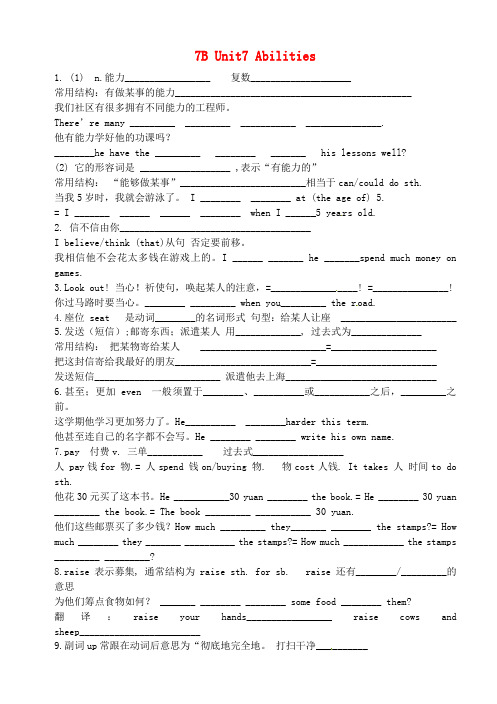
7B Unit7 Abilities1. (1) n.能力_________________ 复数____________________常用结构:有做某事的能力_______________________________________________我们社区有很多拥有不同能力的工程师。
There’re many _________ _________ ___________ _______________.他有能力学好他的功课吗?________he have the _________ ________ _______ his lessons well?(2) 它的形容词是 __________________ ,表示“有能力的”常用结构:“能够做某事”_________________________相当于can/could do sth.当我5岁时,我就会游泳了。
I ________ ________ at (the age of) 5.= I _______ ______ ______ ________ when I ______5 yea rs old.2. 信不信由你______________________________________I believe/think (that)从句否定要前移。
我相信他不会花太多钱在游戏上的。
I ______ _______ he _______spend much money on games.3.Look out! 当心!祈使句,唤起某人的注意,=_________________! =_______________! 你过马路时要当心。
________ _________ when you_________ the r oad.4.座位 seat 是动词________的名词形式句型:给某人让座 _______________________5.发送(短信);邮寄东西;派遣某人用_____________, 过去式为______________常用结构:把某物寄给某人 _________________________=_____________________把这封信寄给我最好的朋友___________________________=________________________发送短信_________________________ 派遣他去上海______________________________6.甚至;更加 even 一般须置于________、__________或___________之后,_________之前。
七年级英语下册Unit7Abilities知识点精讲(下)(新版)牛津版
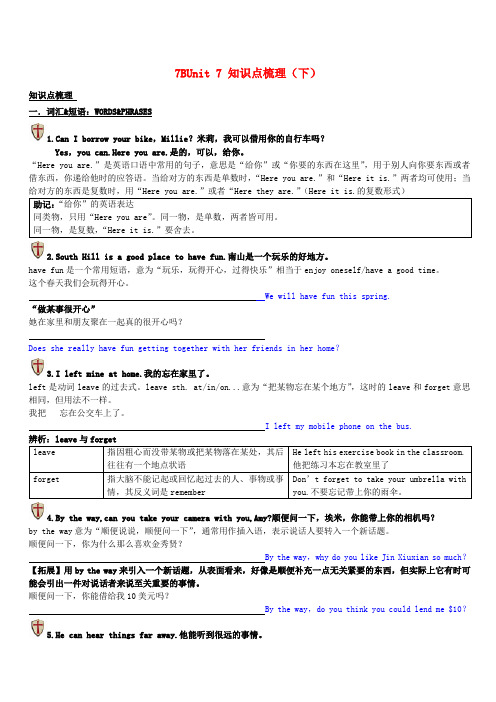
7BUnit 7 知识点梳理(下)知识点梳理一.词汇&短语:WORDS&PHRASES1.Can I borrow your bike,Millie?米莉,我可以借用你的自行车吗?Yes,you can.Here you are.是的,可以,给你。
“Here you are.”是英语口语中常用的句子,意思是“给你”或“你要的东西在这里”,用于别人向你要东西或者借东西,你递给他时的应答语。
当给对方的东西是单数时,“Here you are.”和“Here it is.”两者均可使用;当给对方的东西是复数时,用“Here you are.”或者“Here they are.”(Here it is.的复数形式)助记:“给你”的英语表达同类物,只用“Here you are”。
同一物,是单数,两者皆可用。
同一物,是复数,“Here it is.”要舍去。
2.South Hill is a good place to have fun.南山是一个玩乐的好地方。
have fun是一个常用短语,意为“玩乐,玩得开心,过得快乐”相当于enjoy oneself/have a good time。
这个春天我们会玩得开心。
We will have fun this spring.“做某事很开心”她在家里和朋友聚在一起真的很开心吗?Does she really have fun getting together with her friends in her home?3.I left mine at home.我的忘在家里了。
left是动词leave的过去式。
leave sth. at/in/on...意为“把某物忘在某个地方”,这时的leave和forget意思相同,但用法不一样。
我把忘在公交车上了。
I left my mobile phone on the bus.辨析:leave与forgetleave 指因粗心而没带某物或把某物落在某处,其后往往有一个地点状语He left his exercise book in the classroom. 他把练习本忘在教室里了forget 指大脑不能记起或回忆起过去的人、事物或事情,其反义词是remember Don’t forget to take your umbrella with you.不要忘记带上你的雨伞。
Unit7Abilities知识点梳理2021-2022学年牛津译林版英语七年级下册

Unit 7 AbilitiesComic strip1.Believe it or not!信不信由你(P80)(1)believe it or not意思是”信不信由你“,是由whether you believe it or not变化而来,通常放在句首,后面加逗号,再接主句。
Believe it or not,I am feeling homesick now.信不信由你,我现在想家了。
(2)believe此处是及物动词,意思是相信,后加名词,代词作宾语,也可以跟that等引导的宾语从句。
You can’t believe anything she says.你不能相信她说的任何事情。
It’s hard to believe that he is only 10.很难相信他只有10岁。
(拓展)believe sb意思是“相信某人‘(所说的是真的),believe in sb信任某人2.Look out,Eddie!埃迪,当心!(P80)Look out意思是”留神,当心,小心“多用于口语中,提醒注意安全,Look out! The car is coming. 注意,车来了。
Look out!The water is too deep. 注意,水太深了。
(拓展)take care和be careful也有“小心,当心,注意”的意思3.People have different abilities.人们有不同的能力。
(p80)ability 此处是可数名词,表示“能力”不同种类的能力,复数形式是abillities,,形容词形式是able,意思是“有能力的,(have)the ability to do sth意思是(有)做某事的能力。
I think Tom has the ability to be our monitor.我认为汤姆有当班长的能力。
He is a man of ability.他是一位有能力的人。
牛津七年级下下册 期末知识点归纳 unit 7
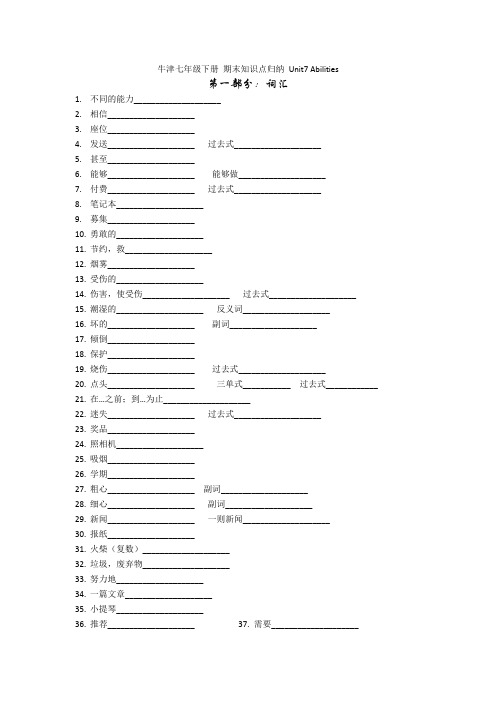
牛津七年级下册期末知识点归纳Unit7 Abilities第一部分:词汇1.不同的能力____________________2.相信____________________3.座位____________________4.发送____________________ 过去式____________________5.甚至____________________6.能够____________________ 能够做____________________7.付费____________________ 过去式____________________8.笔记本____________________9.募集____________________10.勇敢的____________________11.节约,救____________________12.烟雾____________________13.受伤的____________________14.伤害,使受伤____________________ 过去式____________________15.潮湿的____________________ 反义词____________________16.坏的____________________ 副词____________________17.倾倒____________________18.保护____________________19.烧伤____________________ 过去式____________________20.点头____________________ 三单式___________ 过去式____________21.在…之前;到…为止____________________22.迷失____________________ 过去式____________________23.奖品____________________24.照相机____________________25.吸烟____________________26.学期____________________27.粗心____________________ 副词____________________28.细心____________________ 副词____________________29.新闻____________________ 一则新闻____________________30.报纸____________________31.火柴(复数)____________________32.垃圾,废弃物____________________33.努力地____________________34.一篇文章____________________35.小提琴____________________36.推荐____________________ 37. 需要____________________【词汇强化练习】1.People have different _______________(能力). Some people use them to help others.2.Jack is one of the _______________(成员)of Helping Hands Club.3.I _______________(相信)our football team will win.4.People in China _______________(栽种)trees in spring.5.There was lots of _______________(烟) from the window of a wooden house just now.6.Mr Black _______________(冲) into the burning room to save the old man yesterday.7.We should _______________(保护) the animals. They are our friends.8.Cover yourself with a _______________(毛毯) if you feel cold.9.Is the fire still _______________(燃烧)?10.The students are _______________(兴奋的)because they are going to summer camp.11.She couldn’t get out of the car because she _______________(伤害)her leg.12.It is a good habit to check your work _______________(仔细) before you hand it in.13.I like reading _______________(报纸) after breakfast every morning.14.MO Yan is a famous writer. He can write good _______________(文章).15.I am sure that Tom can get the _______________(奖项)because he is very brave.16.The parents’ meeting is _______________(可能)to be in the morning.17.Students can learn more about the world in _______________(地理) lessons.18.Tom _______________(练习)hard on volleyball every day.19.We’ll _______________(推荐) Wang Lei for our monitor.20.The old man _______________(迷失) his way. Let’s go and help him.21.How many _______________(notebook) do you need?22.Please take the _______________(danger) things away.23.A boy is hurt, but not _______________(bad).24.Thousands of _______________(visit) come to Lianyungang every year.25.Peter fell down from his bike, and he _______________(hurt) his feet.第二部分:词组1.在…岁时____________________2.迷路____________________3.参加____________________4.尽某人最大的努力____________________5.没问题____________________6.顺便问一下____________________7.在隔壁____________________8.为…付款____________________ 付款给某人____________________9.为…募集资金____________________10.留神,当心____________________11.信不信由你____________________12.给某人邮寄某物____________________13.把火扑灭____________________ 把它扑灭____________________14.在医院工作____________________ 生病住院____________________15.在公车上给人让座________________________________________16.清理公园____________________17.参观老年公寓____________________18.有能力交学费________________________________________19.独自一人在家____________________20.听见某人正在做某事________________________________________21.听见某人经常做某事________________________________________22.与hear类似用法的单词还有________________________________________23.一个89的老人____________________24.伤得很严重____________________25.把水泼在他衣服上________________________________________26.小心火________________________________________27.做些事情来保护自己________________________________________28.让头发远离火源________________________________________29.在…方面做得好(2种)_________________________ _______________________30.和光速一样快_________________________31.拉小提琴_________________________32.得奖_________________________33.收到某人的来信_________________________34.最需要……_________________________35.为孩子们收集一些书_________________________36.出去_________________________37.感叹句的结构_________________________ _________________________38.学英语学得好_________________________ 身体好_________________________39.一个玩乐的好地方_________________________40.在这个科目上学习努力_________________________41.需要多读和多说_________________________42.进入校队_________________________43.计划好一切_________________________44.期盼做某事_________________________45.玩火柴_________________________ 和某人一起玩_________________________46.…的成员_________________________第二部分:句子1.他经常在车上让座。
江苏省涟水县红日中学七年级英语下册《Unit 7 Abilities》知识点归纳 (新版)牛津版

Abilities一、词组:1. be careful / look out / take care 当心、小心2. different abilities 不同的能力3. recommend sb. for sth. / doing sth. 推荐某人(获得某物 / 做某事)4. plant trees 植树5. clean up 清理干净 / clean up the park 把公园打扫干净6. give a seat to someone on the bus 在公共汽车上给人让座7. collect things for Project Hope 为希望工程募集东西8. visit a home for the elderly 参观老年公寓9. a brave girl 一位勇敢的女孩10. an eight-year-old girl 一位8岁的女孩11. help her neighbour out of a fire 帮助她的邻居逃离火海12. be at home alone 独自一人在家13. hear someone shouting 听到有人大声叫喊14. a lot of smoke from n ext door 许多烟从隔壁冒出来15. hurt his leg 弄伤了他的腿16. run back to her flat quickly 迅速跑回她的套间17. pour water over her jacket 用水浇透了她的夹克衫18. rush into Mr Sun’s kitchen 跑进孙先生的厨房19. put out 扑灭、熄灭 / put out the fire with a blanket 用毛毯扑灭火20. burn Wang Fang’s neck 烧伤了王芳的脖子21. be in hospital for two months 住院两个月22. help each other 互相帮助 / learn from each other 互相学习23. keep one’s life from danger 使某人的生命脱离危险24. keep sb (away) from sth / doing sth 阻止某人(某事/做某事)25. by oneself = alone 独自26. hurt by fire = burn 烧伤27. thank you for joining us 感谢你加入我们28. take part in (活动) = join 参加29. sound dangerous 听起来是危险的30. do something for your own safety 为你自己的安全采取措施31. what happened to Wang Fang 王芳发生了什么事32. a good idea 一个好主意33. get better 变得更好34. be careful with matches 小心火柴35. Do not leave the stove on . 别让炉火开着。
苏教译林版初中英语-七年级下册Unit-7知识梳理
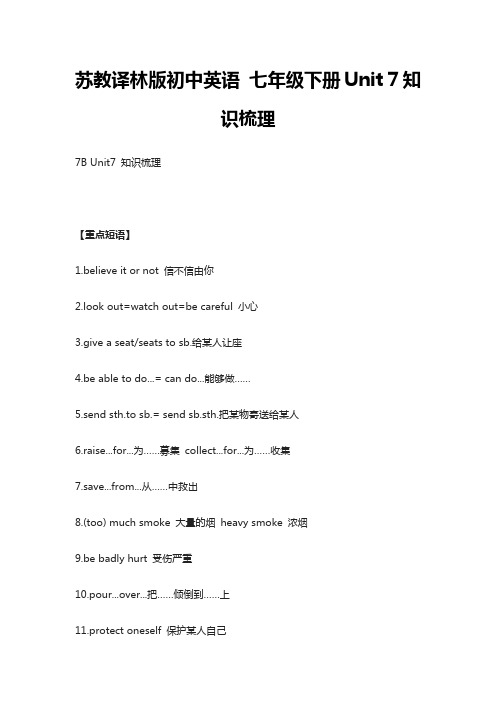
苏教译林版初中英语七年级下册Unit 7知识梳理7B Unit7 知识梳理【重点短语】1.believe it or not 信不信由你2.look out=watch out=be careful 小心3.give a seat/seats to sb.给某人让座4.be able to do...= can do...能够做……5.send sth.to sb.= send sb.sth.把某物寄送给某人6.raise...for...为……募集collect...for...为……收集7.save...from...从……中救出8.(too) much smoke 大量的烟heavy smoke 浓烟9.be badly hurt 受伤严重10.pour...over...把……倾倒到……上11.protect oneself 保护某人自己protect...from...保护……远离……12.rush into...冲进……13.put out the fire 扑灭火14.in hospital 住院in the hospital 在医院里15.at that moment 在那一刻16.news 不可数newspaper 可数17.play with matches 玩火柴18.work/study hard 努力工作/学习19.try/do one’s best to do...尽某人最大努力做……20.do well in...擅长……do better in...在……方面做得更好/更擅长……be good at...擅长……be better at...在……方面做得更好/更擅长……21.show sb.how to do...向某人展示如何……22.people in need 需要帮助的人in need of...在……方面有需求23.lose one’s way= sb.get/be lost 迷路(one’s不要换成the)24.hear from sb.=get/receive a letter from sb.收到某人的来信25.recommend sb.for...推荐某人获得……26.clean up the park 清理干净公园27.visit an old people’s home 拜访老年之家28.give a seat to someone on the bus 在公交车上给某人让座29.be careful with...当心……30.leave sth.at/in sp.把某物落在某地(leave--left)31.call for help 呼救32.work hard on...在……努力33.most +n.most of the +n.34.need...most 最需要……【重点句型】1.What can we do for the children in poor areas?我们可以为贫困地区的孩子们做什么?2.They need clothes and shoes most.他们最需要衣服和鞋子。
初一英语下册Unit7 知识点归纳
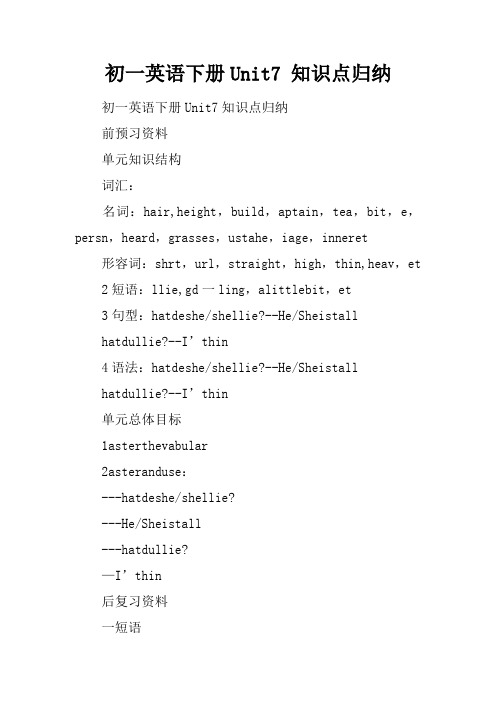
初一英语下册Unit7 知识点归纳初一英语下册Unit7知识点归纳前预习资料单元知识结构词汇:名词:hair,height,build,aptain,tea,bit,e,persn,heard,grasses,ustahe,iage,inneret 形容词:shrt,url,straight,high,thin,heav,et 2短语:llie,gd一ling,alittlebit,et3句型:hatdeshe/shellie?--He/Sheistallhatdullie?--I’thin4语法:hatdeshe/shellie?--He/Sheistallhatdullie?--I’thin单元总体目标1asterthevabular2asteranduse:---hatdeshe/shellie?---He/Sheistall---hatdullie?—I’thin后复习资料一短语1llie看起来像2url/shrt/straight/lnghair卷/短/直发3ediuheight/build中等高度/身体4alittlebit一点儿…appsinger一位流行歌手6haveanel呈现新面貌7gshpping去购物8theaptainfthebasetballtea 篮球队队长9beppularithsb为---所喜爱10nef------中的一个11stptdsth停下来去做某事12stpdingsth停止正在做的事情13telles/stries讲笑话/讲故事14havefundingsth愉快地做某事1reebertdsth记得做某事16reeberdingsth记得做过某事二本单元的重点句:1Isthaturfriend?N,itisn’t2hatdesshellie?3IthinInher4angLinistheaptainfthebasetballtea She’salittlebitquiet6XuQianlvesttelles7Sheneverstpstaling8Sheliesreadingandplainghess9Idn’tthinhe’ssgreat10Iangshppingandnbdnse11Nhehasanel三重难点解析1hatdes/d+主语+llie?询问某人的外貌特征,看上去什么样?Eg:hatdesurfriendllie?2形容头发时,可按照先长短,后曲直,最后说颜色的顺序说。
苏教牛津译林版七年级下册英语Unit7 Abilities Reading1课件
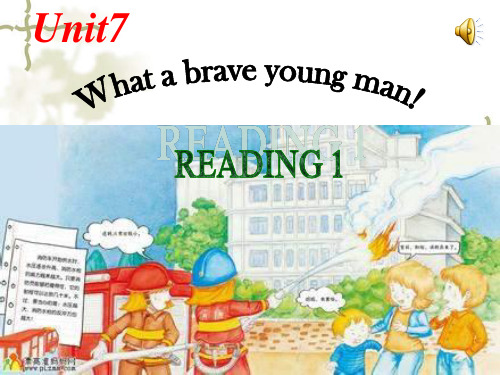
( 7 ) He was in hospital for two months. ( 2 ) He heard someone shouting “Fire! Fire! Help!”. ( 5 ) He helped Mrs. Sun out of the fire.
Reporter: You’re a brave young man, Lin Tao. How old are you? Lin Tao: I’m twenty. Reporter: Can you tell us about the fire?
Work out the orders(顺序)
It was 10th May, … ( 3 ) He saw a lot of smoke from next door. ( 6 ) Later some firemen came and put out the fire. ( 1 ) He was alone at home. ( 4 ) He poured water over his clothes and rushed
Where__ What happened
Lin Tao’s neck, arms and face was badly_h_u_r_t__. In hospital Many people visited him and gave flowers and presents. “How_b_r_a_v_e_ you are!” they said, “Are you _a__fr_a_i_d_?” Liu Tao said “A little but had no time to think about it .And fire is d__a_n_g_e_ro_u__s _.” It is important to be __ca_r_e_f_u_l__with fire.
江苏专版牛津译林七年级下册 Unit 7 知识点复习总结
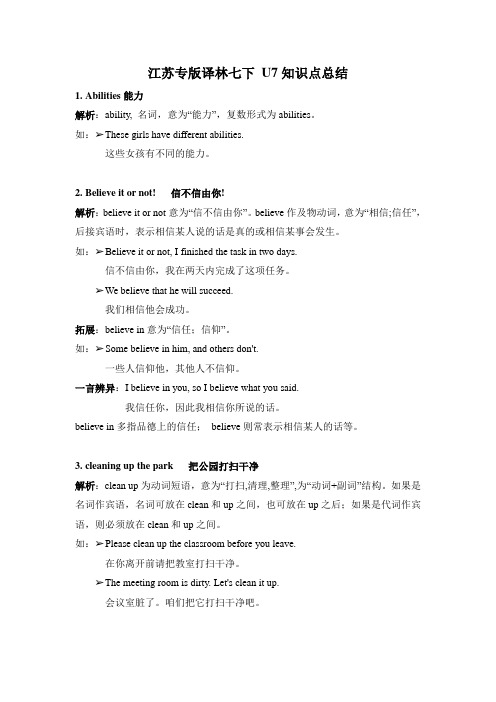
江苏专版译林七下U7知识点总结1.Abilities能力解析:ability, 名词,意为“能力”,复数形式为abilities。
如:➢ These girls have different abilities.这些女孩有不同的能力。
2.Believe it or not! 信不信由你!解析:believe it or not意为“信不信由你”。
believe作及物动词,意为“相信;信任”,后接宾语时,表示相信某人说的话是真的或相信某事会发生。
如:➢ Believe it or not, I finished the task in two days.信不信由你,我在两天内完成了这项任务。
➢ We believe that he will succeed.我们相信他会成功。
拓展:believe in意为“信任;信仰”。
如:➢ Some believe in him, and others don't.一些人信仰他,其他人不信仰。
一言辨异:I believe in you, so I believe what you said.我信任你,因此我相信你所说的话。
believe in多指品德上的信任;believe则常表示相信某人的话等。
3.cleaning up the park 把公园打扫干净解析:clean up为动词短语,意为“打扫,清理,整理”,为“动词+副词”结构。
如果是名词作宾语,名词可放在clean和up之间,也可放在up之后;如果是代词作宾语,则必须放在clean和up之间。
如:➢ Please clean up the classroom before you leave.在你离开前请把教室打扫干净。
➢ The meeting room is dirty. Let's clean it up.会议室脏了。
咱们把它打扫干净吧。
4.giving a seat to someone on the bus 在公共汽车上给某人让座解析:seat是可数名词,意为“座位”。
七年级下册英语7单元知识点
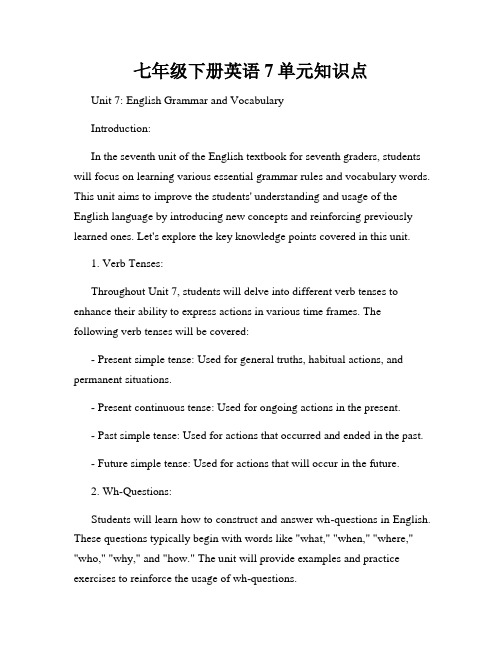
七年级下册英语7单元知识点Unit 7: English Grammar and VocabularyIntroduction:In the seventh unit of the English textbook for seventh graders, students will focus on learning various essential grammar rules and vocabulary words. This unit aims to improve the students' understanding and usage of the English language by introducing new concepts and reinforcing previously learned ones. Let's explore the key knowledge points covered in this unit.1. Verb Tenses:Throughout Unit 7, students will delve into different verb tenses to enhance their ability to express actions in various time frames. The following verb tenses will be covered:- Present simple tense: Used for general truths, habitual actions, and permanent situations.- Present continuous tense: Used for ongoing actions in the present.- Past simple tense: Used for actions that occurred and ended in the past.- Future simple tense: Used for actions that will occur in the future.2. Wh-Questions:Students will learn how to construct and answer wh-questions in English. These questions typically begin with words like "what," "when," "where," "who," "why," and "how." The unit will provide examples and practice exercises to reinforce the usage of wh-questions.3. Adverbs of Frequency:In this unit, students will gain an understanding of adverbs of frequency, which indicate how often an action occurs. Adverbs such as "always," "often," "sometimes," "rarely," and "never" will be explored. Students will learn how to use these adverbs to describe routines and habits.4. Comparative and Superlative Forms:The comparative and superlative forms of adjectives will be introduced. Students will learn how to compare and rank items or people using words like "bigger," "better," "more beautiful," "the most interesting," and so on.5. Vocabulary:Unit 7 will expand students' vocabulary by introducing new words and phrases related to various topics. Vocabulary words may include professions, hobbies, sports, food, transportation, and more. Students will practice using these words in sentences to enhance their vocabulary and communication skills.Conclusion:In Unit 7 of the seventh-grade English textbook, students will delve into important grammar rules and expand their vocabulary. From verb tenses and wh-questions to adverbs and comparative forms, students will acquire new knowledge and master essential language skills. By studying the content provided and completing practice exercises, students will enhance their understanding and usage of the English language, making significant progress in their language learning journey.。
江苏省永丰初级中学七年级英语下册《Unit 7 Abilities》知识点整理 (新版)牛津版

《Unit 7 Abilities》1.信不信由你!Believe it or not!2.当心!Look out!3.你能做什么?What can you do?4.互助俱乐部Helping Hands Club5.植树plant trees6.帮助一位老人help an old man7.把公园打扫干净clean up the park8.在公共汽车上给人让座give a seat to someone on the bus9.为希望工程收集物品collect things for Project Hope10.拜访老年公寓visit an old people’s home11.我们能为贫困地区的孩子们做什么呢?What can we do for the children in poor areas?12.他们最需要衣服和鞋子。
They need clothes and shoes most.13.寄一些给他们send some to them14.一些家庭甚至支付不起钢笔和笔记本的费用。
Some families are not even able to pay for pens and notebooks.15.我们可以为他们募集一些买这些东西的钱。
We can raise some money fo r them to buy these things.16.为孩子们收集一些书collect some books for the children17.一位勇敢的年轻人 a brave young man18.多么勇敢的一位年轻人啊!What a brave young man!19.从火中救出他的邻居save his neighbour from a fire20.他非常勇敢地从火中救出饿了他的邻居。
He was brave enough to save his neighbour form a fire.21. 在5月10号on May 10th22. 独自呆在家stay at home alone23. 突然,他听见有人在叫:“着火啦,着火啦,救命啊!”Suddenly, he heard someone shouting “Fire! Fire! Help!”24. 许多烟 a lot of smoke25. 隔壁next door26. 他跑出去,并且看见隔壁冒出许多烟。
牛津版英语七年级下册Unit 7单词讲解 课件
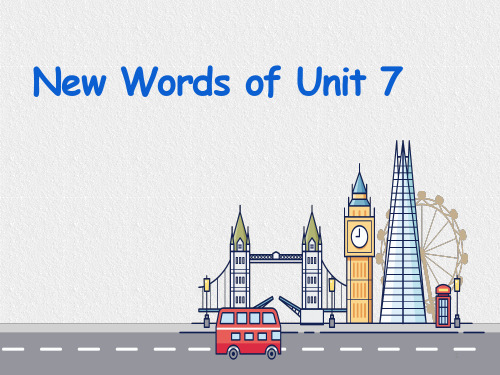
could 可以、允许 (表示委婉语气) --Could he go now? --Of course, he can.
18
pour [pɔː(r)] v.
19
protect [prəˈtekt] v.
protect...from...
保护……免受……
20
rush [rʌʃ] v.
sir madam recommend award part take part in need lose lose one's way before hear from yours faithful6l4y
brave [breɪv] adj.
12
save [seɪv] v. save...from...
13
smoke [sməʊk] n. smoke v.
14
next door
15
badly [ˈbæ dli] adv.
16
hurt [hɜːt] adj. hurt v.
17
could [kəd; kʊd] modal v.
burn [bɜːn] v.
burn-burnt/burned 26
in hospital
in the hospital 在医院里 27
moment [ˈməʊmənt] n. at the moment 此刻 at that moment 在那时
28
nod [nɒd] v.
29
careful [ˈkeəfl] adj.
care-careful/careless-
carefully/carelessly
46
piano [piˈæ nəʊ] n. play the piano 弹钢琴
牛津七年级下Unit7语法专题(19PPT)

由what引导的感叹句,主要用来修饰名词,分为以下3种结构: What+a/an+形容词+可数名词单数+主语+谓语!
It is a red apple. What a red apple it is!
Eg: What a cute boy he is ! What a nice present it is !
Eg: --Can you ride a b, I can’t
--Could you ride a bike at 10 years old? --Yes, I could./No, I couldn’t.
2)can/could在表示请求和允许时,can提问用can回答,could提问还用can回答。 Eg: --Could I come to see you tomorrow? --Yes, you can. / No, I’m afraid not
知识梳理
what感叹句的构成
由what引导的感叹句,主要用来修饰名词,分为以下3种结构: What+形容词+不可数名词+主语+谓语!
It is tasty food. What tasty food it is!
Eg: What pleasant weather it is ! What important news it is !
例4. --David, is that man your headmaster?
--It _________ be him. He’s having a meeting.
A. mustn’t
B. can’t
C. won’t
D. shouldn’t
随堂练习
江苏省仪征市实验中学七年级英语下册 Unit 7 Abilities知识点总结 (新版)牛津版
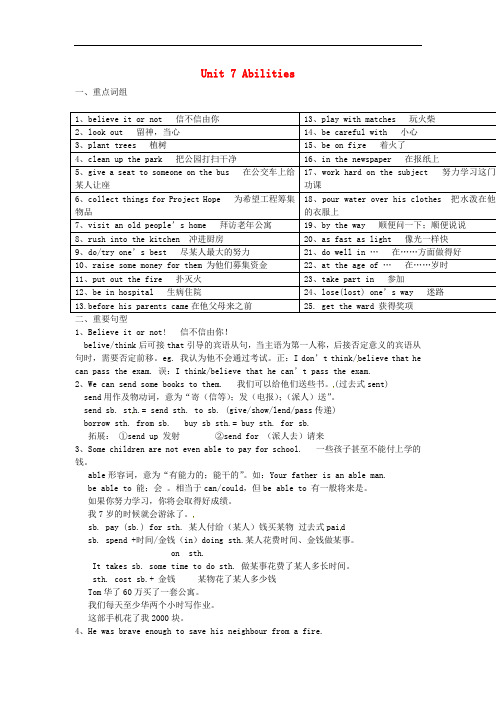
Unit 7 Abilities一、重点词组1、believe it or not 信不信由你13、play with matches 玩火柴2、look out 留神,当心14、be careful with 小心3、plant trees 植树15、be on fi re 着火了4、clean up the park 把公园打扫干净16、in the newspaper 在报纸上5、give a seat to someone on the bus 在公交车上给某人让座17、work hard on the subject 努力学习这门功课6、collect things for Project Hope 为希望工程筹集物品18、pour water over his clothes 把水泼在他的衣服上7、visit an old people’s home 拜访老年公寓19、by the way 顺便问一下;顺便说说8、rush into the kitchen 冲进厨房20、as fast as light 像光一样快9、do/try one’s best 尽某人最大的努力21、do well in …在……方面做得好10、raise some money for them 为他们募集资金22、at the age of …在……岁时11、put out the fire 扑灭火23、take part in 参加12、be in hospital 生病住院24、lose(lost) one’s way 迷路13.before his parents came在他父母来之前25. get the ward 获得奖项1、Believe it or not! 信不信由你!belive/think后可接that引导的宾语从句,当主语为第一人称,后接否定意义的宾语从句时,需要否定前移。
eg. 我认为他不会通过考试。
- 1、下载文档前请自行甄别文档内容的完整性,平台不提供额外的编辑、内容补充、找答案等附加服务。
- 2、"仅部分预览"的文档,不可在线预览部分如存在完整性等问题,可反馈申请退款(可完整预览的文档不适用该条件!)。
- 3、如文档侵犯您的权益,请联系客服反馈,我们会尽快为您处理(人工客服工作时间:9:00-18:30)。
苏教版牛津英语七年级下册第七单元知识点
一、课文知识讲解
( 1) .描述某人
He /she is a⋯..boy/ girl.
他 / 她是一位⋯.男孩 / 女孩。
When he/ she is free, he/ she always⋯.
当他 / 她有空时,他 / 她总是⋯.
他/ 她是⋯一员,经常帮助⋯.
( 2)表示听见某人在做某事
Suddenly, he heard someone shouting“Fire! Fire! Help!”
突然,他听到有人大喊“着火了!着火了!救命啊!” ( 3)
表示有时间做某事
⋯..but I didn’ t have time to think about it.
但是我没有时间去想。
( 4)推荐某人
I would like to recommend⋯ for ⋯我想要为⋯推.荐⋯⋯
We all think he/ she should get⋯我..们都认为他 / 她应该得到⋯⋯
二、重要词组
believe it or not信不信由你pay for 为、、、、付款
save ⋯⋯ .from从⋯⋯..救.出
⋯⋯put out 扑灭,熄灭
be careful with小心⋯⋯.do/ try one ’ s best尽某人最大的努力take part in参加hear from 收到⋯⋯的来信
plant trees种树give a seat to someone on the bus 在公交车上给某人让座
collect things for Project Hope为希望工程收集东西clean up the park 打扫公园
visit an old people’ s 拜home访养老院
三、语法知识点讲解
情态动词 can、could、may 没有人称和数的变化,虽有词义但不完整,不能单独作谓语,必须和动词原形连用,才能表达完整的意思。
(一) can 和 could 的用法
1.can 表示能力,意思是“能,会”。
后面直接跟动词原形,用于一切人称和数。
Can的否定式为can not,缩写为 can’t。
过去式为 could.
如: I can sing in English now.
我现在会用英语唱歌了。
We can speak much English now, but we couldn’ t one year ago.
我们现在能讲英语了,但是一年前不会。
2.表示客观可能性,意思是“可能”。
如: Millie can be well again.
米莉可能已经恢复健康了。
She can ’ t be in the classroom. Shein myis room now.
她不可能在教室里,她现在在我的房间里。
3.表示许可,意思是“可以”
如: You can watch TV after supper.
晚饭后你可以看电视。
You can stay here for another six weeks.
你可以再在这儿呆六个星期。
4.表示请求,意思是“可以”。
在这种语境下,使用could 比 can 语气
更委婉客气。
Could 此时和 can 没有时间上的差别,用于疑问句,不
用于肯定句,回答时要改用can。
如: ---Could I go shopping with you?
---Yes, I can.
5.can, could 只用在现在时和过去时两种时态中,其他时态用be able
to 来代替。
如: Will you be able to help me with my English next year?
(2)may 的用法
1.表示许可或征求对方的许可,有“可以”的意思
如: It ’s already six. You may go now.
May I use your computer?
2.回答以 may 开头的疑问句有如下表达法:
---May I smoke here?
---Yes, you may./ Yes, please.
---No, you can’ t./No, you mustn’ t.
以 What 引导的感叹句
1.可用句型:“What + a/an +形容词+可数名词单数+主语+谓语!”。
如:
What a nice present it is! 它是一件多么好的礼物啊!
What an interesting book it is! 它是一本多么有趣的书啊!
2.可用句型:“ What+形容词+可数名词复数+主语+谓语!”。
如:What beautiful flowers they are! 多么漂亮的花啊!
What good children they are! 他们是多么好的孩子啊!
3.可用句型:“ What+形容词+不可数名词+主语+谓语!”。
如:What fine weather it is today! 今天天气多好啊!
What important news it is! 多重要的新闻啊!
由 how 引导的感叹句,其句子结构也分为三种:
1.可用句型:“ How+形容词 / 副词+主语+谓语!”。
如:
How careful she is! 她多么细心啊!
How fast he runs! 他跑得多快啊!
2.可用句型:“How +形容词+ a/an +可数名词单数+主语+谓语!”。
如:
How beautiful a girl she is! 她是个多么漂亮的姑娘啊!
3.可用句型:“ How+主语+谓语!”。
如:
How time flies! 光阴似箭!
由what 引导的感叹句与由 how 引导的感叹句有时可以转换,但句中部分单词的顺序要有所变化。
如:
How beautiful a girl she is! = What a beautiful girl she is!
What delicious cakes these are! = How delicious these cakes are。
